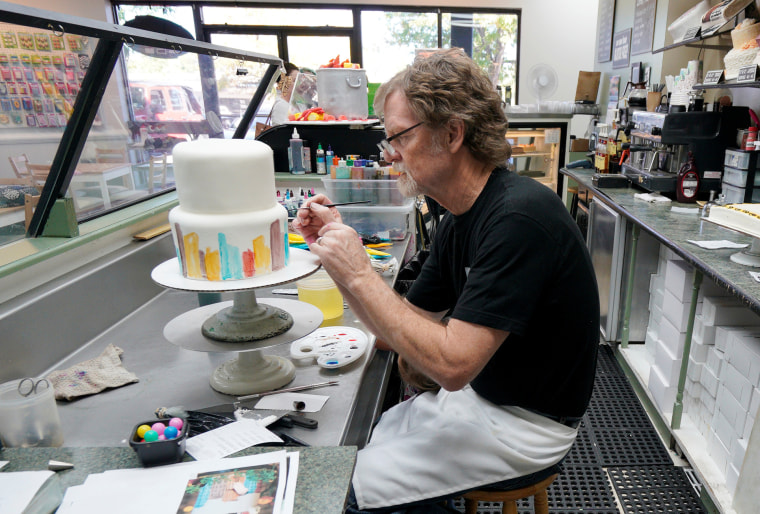Masterpiece Cakeshop owner Jack Phillips is in court again, this time over allegations that his business unlawfully refused service to a transgender woman who requested trans-themed birthday cake. The plaintiff, Autumn Scardina, had previously filed a complaint against Phillips with the Colorado Civil Rights Commission and is now in the midst of a lawsuit at the district level.
Both actions stem from a call Scardina says she made to the Lakewood, Colorado, bakery on June 26, 2017 — the same day the Supreme Court announced it would take up a separate case involving Masterpiece Cakeshop’s refusal to make a same-sex wedding cake. Scardina, an attorney and activist, says she tried to order a pink cake with blue frosting, but that the bakery refused her request after she explained it was intended to recognize her identity as a transgender woman, according to court documents. She alleges that a representative of the Christian bakery told her it “did not make cakes for ‘sex changes.’”
Following Scardina’s first complaint, Phillips filed a countersuit against the Colorado Civil Rights Commission in August 2018, and he and the commission settled last March, agreeing to not move forward with the case. In a previous case, the seven-member commission had found Phillips in violation of the state’s nondiscrimination laws for refusing service to a gay couple who ordered a wedding cake in 2012 (the Supreme Court overturned the commission’s decision in a narrow 2018 ruling, finding that its members displayed “clear and impermissible hostility” to religion).
The Colorado Civil Rights Commission declined NBC News’ request for comment, saying that it can’t comment on pending litigation.
After the commission dropped Scardina’s case, she filed a separate lawsuit last June arguing that Masterpiece Cakeshop violated both Colorado’s Anti-Discrimination Act and the Colorado Consumer Protection Act. The complaint, filed with the District Court for the City and County of Denver, alleges that the business “refused to sell a birthday cake to Ms. Scardina because she is transgender despite repeatedly advertising that they would sell birthday cakes to the general public, including LGBT individuals.” The prior complaint clarifies that the cake was meant to celebrate both Scardina’s birthday, which is on July 7, and the seventh anniversary of her “transition from male to female.”
Scardina’s attorney, Paula Greisen, said that her client’s case shows that Masterpiece Cakeshop has been engaging in deceptive business practices, accusing the bakery of not being “honest with the public.”
“The dignity of all citizens in our state needs to be honored,” Greisen said in a statement when the case was originally filed last year. “Masterpiece Cakeshop said before the Supreme Court they would serve any baked good to members of the LGBTQ community. It was just the religious significance of it being a wedding cake.”
But in a Thursday hearing, Phillips’ attorneys requested that the Denver court immediately dismiss the lawsuit. Jake Warner, legal counsel with the Alliance Defending Freedom, said that Scardina should “have filed at the court of appeals” instead of filing a new lawsuit at the district court level. Warner claimed the “plaintiff wants to start the case all over and that isn’t fair to Mr. Phillips.”
“At some point, your honor, this must stop,” he said, as the legal website Courthouse News previously reported. “Mr. Phillips just wants to get back to his life and make cakes.”
Representatives with Alliance Defending Freedom, a conservative Christian legal group that also represented Phillips in his case before the Supreme Court, said Scardina’s continued pursuit of the case is intended to “harass” Phillips over his religious beliefs. In a statement shared with NBC News, Kristen Waggoner, senior vice president of ADF’s U.S. legal division, said Phillips is being targeted “because he won’t create custom cakes that express messages or celebrate events in conflict with his conscience.”
“This attorney’s relentless pursuit of Jack was an obvious attempt to punish him for his views, banish him from the marketplace and financially ruin him and his shop,” Warner added.
But Scardina and her legal team, which did not respond to NBC News’ request for comment, have maintained that they “simply want the law to be enforced.”
“Because if not, you allow a business to send a message — ‘Go ahead, refuse service to these people, it’s OK’ — when the citizens of Colorado have said it’s not,” Greisen told Colorado Public Radio last year.
The Denver court has yet to state whether it intends to dismiss Scardina’s case, but should it proceed, her lawsuit could decide the most pressing legal question left unresolved by the Supreme Court’s 2018 ruling: Does a business owner have the right to refuse service to an LGBTQ individual or same-sex couple on the basis of faith?
Groups like the American Civil Liberties Union have held that the Supreme Court effectively “punted” on the topic, leaving the issue for a future case to decide.
While the courts weigh the merits of Scardina’s legal challenge, a recent survey found that Americans are somewhat divided on the issue of religiously based service refusals. Although a recently released report from the Public Religion Research Institute found “broad support for LGBT rights across all 50 states,” nearly four in 10 respondents (37 percent) said it should be legal for businesses to refuse service to customers in the name of religion.
The PRRI report found the percentage of Americans who expressed opposition to these religious refusals has decreased slightly in recent years: In 2016, 61 percent of Americans were against allowing businesses to turn away LGBTQ customers, while 56 percent opposed such practices in 2019.



